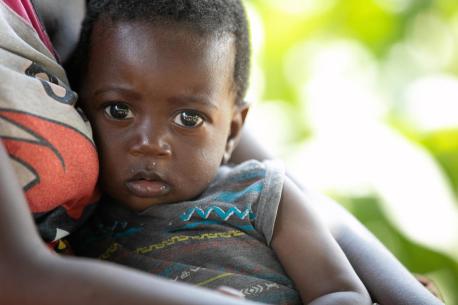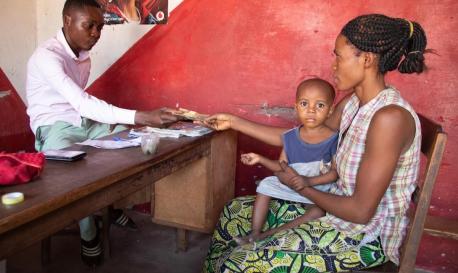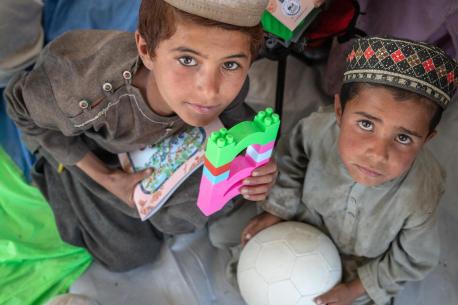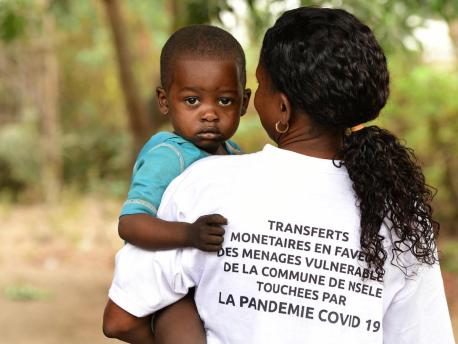
UNICEF: In Fight to Reduce Poverty, Cash Is King
Backed by the findings of a new report, UNICEF issues an urgent call for Universal Child Benefits — cash benefits paid to all families with children — to counter the economic fallout from COVID-19.
For years, UNICEF has successfully provided emergency cash transfers to vulnerable families with children to offset hardship and deprivation caused by poverty, conflict and other crises.
Backed by the findings of a new report, UNICEF is now urging governments to introduce or expand their own child benefit programs — and to make them universal and unconditional.

In Kazakhstan in 2019, UNICEF, in partnership with the Ministry of Labor and Social Protection, launched a "cash plus” assistance program aiming to reach 700,000 impoverished children like Lyubov, 10, and her brother Daniil, 7 months, who live in Nur-Sultan, the capital city. © UNICEF/UNI286628/Nur
Universal child benefits — or UCBs — are the lifeline families need now more than ever, UNICEF argues, as the economic impacts of COVID-19 threaten to undo years of progress against poverty.
Because UCBs provide cash benefits to families with children regardless of a family’s income, they help to narrow existing coverage gaps and fulfill a child’s right to social protection. Families are not typically required to meet specified conditions before receiving the benefit, nor must they contribute to it.

A boy in Sana'a, Yemen, is able to buy food thanks to support his family received through a UNICEF cash assistance program. To date, the program has reached 9 million people across the country. Five years of brutal civil war created widespread food insecurity, high rates of malnutrition among children and other hardships, and now COVID-19 has made the situation even worse. The multipurpose cash transfer program helps the poorest families cover basic food, health and education, among other costs. © UNICEF Yemen/2019
Evidence that cash benefits work
By reducing deprivation, UCBs improve children's overall well-being, health, education, food security, productivity and ability to contribute to their societies and economies when they reach adulthood. Families that receive child benefits are more able to access health care and send their children to school. They are less likely to rely on child labor or suffer from debilitating stress that can lead to domestic strife and violence.
The report, Universal child benefits: Policy issues and options — a joint release by UNICEF and the Overseas Development Institute (ODI) — is a detailed exploration of these and other advantages as well as the practical considerations of the approach. The findings are the culmination of a nearly two-year effort to study UCBs, and to support and promote informed debate and decision making regarding cash transfers.
From this effort, UNICEF and ODI found that UCBs provided to children in middle-income countries at a cost of just 1 percent of GDP would lead to a 20 percent decline in poverty across the entire populations.
And yet only one in 10 countries in the world offer them.

Cash assistance from UNICEF allowed Safia, above, of Dhaka, Bangladesh, to stay in school and avoid early marriage. © UNICEF/UNI239400
As UNICEF points out, some 385 million children around the world already live in extreme poverty, struggling to survive on $1.90 a day or less. Falling into poverty during childhood can have lasting effects. Rarely does a child get a second chance at an education or a healthy start in life.
Before COVID-19, children were already more than twice as likely as adults to live in extreme poverty, and now the economic fallout from the pandemic threatens to hit them the hardest.

Xiong Li of Yunnan province, China, benefited from a conditional cash transfer program supported by UNICEF; to qualify, recipients had to agree to antenatal care, immunization and a hospital delivery. The idea was to promote healthy behaviors by offering a cash incentive that would offset many of the out-of-pocket expenses related to having a baby. © UNICEF/UN0219977/Yuyuan
There are other reasons to universalize benefits rather than provide them to a select group or attach conditions. UCBs:
- avoid burdensome red tape and clerical errors that may inadvertently exclude eligible families
- erase any potential stigma associated with being a recipient
- are easier to scale up in an emergency
Researchers found no evidence that UCBs encourage people to stop working in paid jobs. Rather, the cash transfers help parents manage the demands of employment and meet their families' needs.

These six siblings, Syrian refugees living in Jordan, are among the 10,000 children whose families receive assistance through the Hajati "My Needs" cash transfer program supported by UNICEF. In late 2019, beneficiaries received a winter top-up based on family size to help cover costs of heating fuel, warm clothing and other essentials. More recently, UNICEF worked with the government and other partners to expand the Hajati program to include more households hit hard by the COVID-19 pandemic. © UNICEF/UNI304408/Matas
“Investing in children not only changes their lives but yields high dividends for their communities and for society as a whole,” UNICEF Executive Director Henrietta Fore said.
"Now more than ever, as the economic fallout of COVID-19 threatens to roll back years of progress in reducing poverty, universal child benefits can be a lifeline. They can protect vulnerable families from deepening levels of poverty and deprivation, and can save countries from catastrophic societal and economic impacts.”

Mothers and infants come together at a health center in Kuntaur, Central River region as part of the Building Resilience through Social Transfers for Nutrition Security in The Gambia (BReST) project — an initiative supported by UNICEF that in its first year reached nearly 6,200 lactating mothers in three rural regions with comprehensive nutrition education and a monthly cash benefit to help cover basic costs. © UNICEF/UN0218604/Noorani
As part of its call to action, UNICEF stands ready to work with governments to assist with legislation, policy and financing considerations. UNICEF already works in over 100 countries helping to develop or strengthen their social protection systems and to expand their coverage to reach the most disadvantaged children and adolescents.
Top photo: Clinton, 8 months old, of Tusenke, Gwenbe district, Zambia. Clinton's mother and grandmother receive support through a UNICEF emergency cash transfer program that helps families who are food insecure due to the country's prolonged drought. © UNICEF/UNI297240/Schermbrucker
HOW TO HELP
There are many ways to make a difference
War, famine, poverty, natural disasters — threats to the world's children keep coming. But UNICEF won't stop working to keep children healthy and safe.
UNICEF works in over 190 countries and territories — more places than any other children's organization. UNICEF has the world's largest humanitarian warehouse and, when disaster strikes, can get supplies almost anywhere within 72 hours. Constantly innovating, always advocating for a better world for children, UNICEF works to ensure that every child can grow up healthy, educated, protected and respected.
Would you like to help give all children the opportunity to reach their full potential? There are many ways to get involved.





